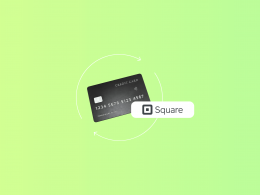If you’re scaling a modern ecommerce company, you need books that keep up with real-time sales, fees, refunds, and inventory changes across multiple channels. Finaloop combines software with a bookkeeping team focused on DTC and wholesale, providing real-time dashboards, automated inventory/COGS tracking, and tax add-ons.
But Finaloop isn’t your only option. Depending on whether you want software you drive yourself, full-service bookkeeping, or a hybrid model, the alternatives given in this article can be a better fit, especially if you need granular control, ERP-grade integrations, or flexible sync modes.
Why companies search for Finaloop alternatives
Finaloop promises real-time bookkeeping, automated reconciliation, and “hands-off” financial operations for ecommerce brands. But practitioners often point out several shortcomings that lead them to explore alternatives:
- Limited customization & rigid automation: Users report that Finaloop doesn’t allow adding new journal accounts or deeply customizing bookkeeping logic.
- Steep learning curve: Some users say Finaloop is a bit hard to navigate at first and takes time to learn which parts are automated and which require manual setup.
- Residual manual work: Even with automation, many brands still need to intervene on edge cases or corrections.
- Opaque pricing tied to gross receipts: Because Finaloop’s pricing is based on projected revenue, brands struggle with unpredictability as their sales fluctuate.
- Integration gaps or workflow limits: Users mention issues with accounts receivable, special payment forms, or non-Shopify complexity.
- Onboarding friction & system adaptability: Some users say going live or handling exceptions can stretch weeks as the system “learns” their model.
In effect, Finaloop delivers a “bookkeeping as a service + automation” experience. The downside is often less flexibility, limited control, and costs that scale in surprising ways. So many brands now prefer tools that blend automation with transparency, extensibility, and control.
Top 5 Finaloop alternatives
Below are six strong alternatives, each suited to different business preferences.
1. Synder (best overall alternative)
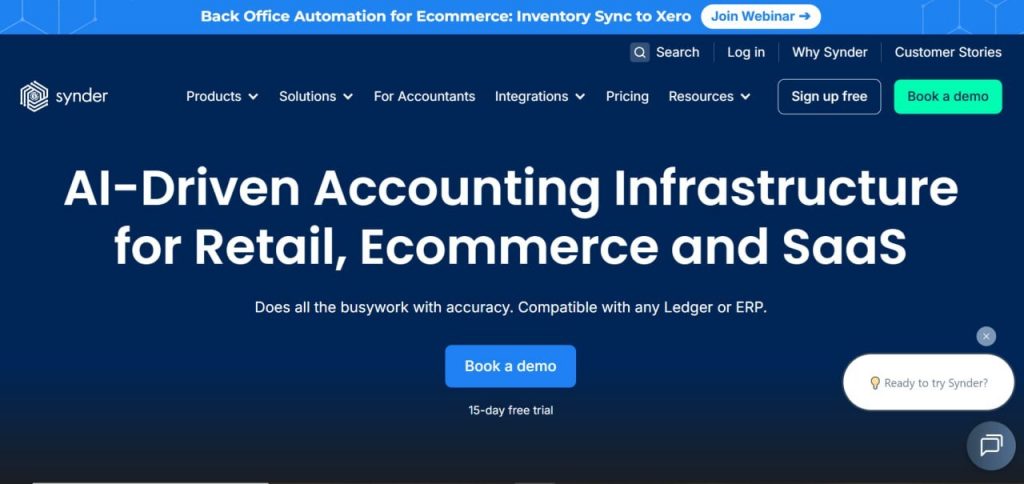
Synder is a comprehensive accounting automation platform designed to simplify financial management for ecommerce and SaaS businesses. It centralizes sales data, automates bookkeeping across multiple channels, and ensures accurate, real-time reporting, helping scaling brands maintain clean, reliable books with minimal manual effort.
Key capabilities
- 30+ ecommerce and payment platforms supported – Synder integrates with Shopify, Amazon, PayPal, Stripe, eBay, Walmart, Etsy, BigCommerce, WooCommerce, and more, automatically consolidating all sales, fees, taxes, refunds, and payouts into one synchronized workflow.
- Integration with major accounting and ERP systems – Connects natively with QuickBooks, Xero, Sage Intacct, and Oracle NetSuite, providing smooth synchronization and scalable accounting automation as your business grows.
- Dual sync modes for total flexibility – Switch between detailed Per Transaction Sync for full audit transparency and Summary Sync for aggregated bookkeeping, which is ideal for high-volume ecommerce operations.
- AI-driven accounting infrastructure – Synder’s intelligent backend uses machine learning to detect anomalies, classify transactions automatically, and continuously improve accuracy with every sync, reducing the need for manual review.
- Smart Rules & advanced mapping – Build precise automation logic for how transactions are categorized, named, split, taxed, and matched, ensuring consistent and GAAP-compliant bookkeeping tailored to your workflows.
- Revenue recognition – Automates ASC 606–compliant revenue recognition for subscription-based and deferred income models, ensuring accurate timing of revenue reporting and transparent, audit-ready records.
Enterprise-grade security with Synder
Synder is built with enterprise-level security at its core. It’s SOC 2 Type II–certified, meaning every process meets rigorous standards for data protection and reliability. With full encryption, strict access controls, and continuous monitoring, Synder ensures your financial data stays private, compliant, and fully secure – no matter how complex your operations become.
Plans & pricing
Basic – $52/month (billed annually): Up to 500 transactions per month, 2 integrations, daily sync, smart reconciliation, basic inventory tracking, and multi-currency support.
Essential – from $92/month (billed annually): 500 to 3,000 transactions per month, unlimited integrations, hourly sync, and extended inventory tracking.
Pro – from $220/month (billed annually): 3,000 to 50,000 transactions per month, unlimited integrations, product mapping, bundle and assemblies sync, and white-glove onboarding.
Premium – Custom pricing: Designed for high-volume or complex multi-entity setups, with dedicated onboarding and priority support.
How Synder compares to Finaloop
| Comparison area | Synder | Finaloop |
| Control & customization | Full control over mapping, journal structure, and sync behavior; easily adjustable to your accounting logic. | Limited customization; users often rely on preset mappings and automated structures. |
| Pricing transparency | Clear, tier-based pricing that scales by transaction volume without any hidden fees or unpredictable increases. | Pricing tied to projected gross receipts, which can fluctuate and lack transparency. |
| Sync flexibility | Offers both detailed transaction-level sync and summary sync modes for scalable bookkeeping. | Focused on full real-time automation with less flexibility for sync depth. |
| ERP readiness & scalability | Seamlessly connects with enterprise systems like Sage Intacct and NetSuite, supporting future growth. | Operates primarily as a standalone bookkeeping solution with limited ERP extensibility. |
| User reviews echo Synder’s advantages: “Synder Drastically Reduced the Time Needed to Close the Books at My SaaS Clients. The Smart Rules Feature works great to customize categorization of different revenue streams, products, and customers. Although there is a bit of up-front work getting the settings configured correctly, once this is done Synder essentially runs itself.” Justin D., Finance Manager |
2. Xero

Xero is a robust cloud-based accounting platform with a large app ecosystem and strong core financial tools. It offers detailed reporting and collaboration features but relies on third-party connectors for ecommerce data, requiring occasional manual reconciliation and connector management.
Key capabilities
- Advanced accounting and financial reporting
- Collaborative tools for team and advisor access
- Extensive marketplace of ecommerce and payment integrations
- Reliable general ledger and audit trail foundation
- Flexible configuration for diverse business models
- Manual oversight for reconciliation and connector management
Plans & pricing
Early – $25/month: Designed for freelancers and very small businesses; includes up to 20 invoices and 5 bills per month, bank reconciliation, cash flow tracking, and Hubdoc document capture.
Growing – $55/month: Ideal for expanding businesses; includes unlimited invoices and bills, full bank reconciliation, bulk transaction management, and short-term cash flow tools.
Established – $90/month: Built for larger or more complex businesses; adds multi-currency support, project tracking, expense management, advanced analytics, and in-depth reporting.
3. Zoho Books
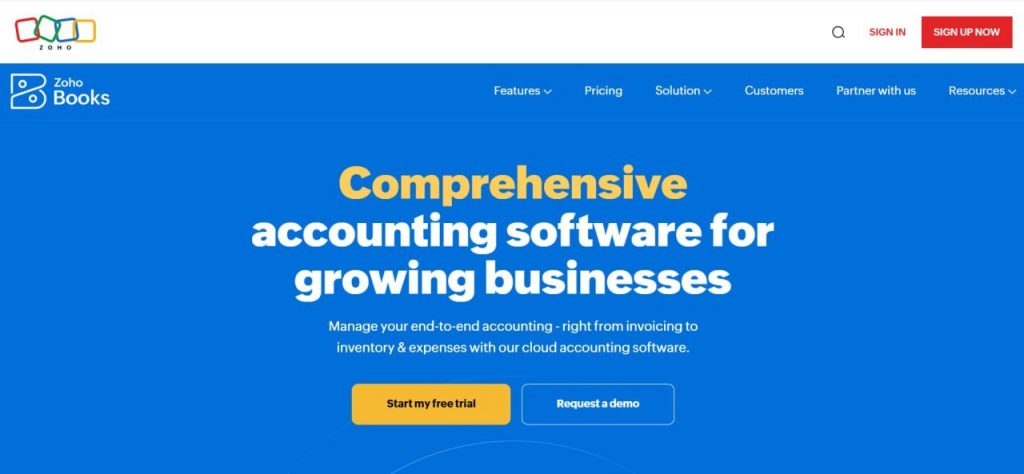
Zoho Books is part of the larger Zoho ecosystem, integrating accounting with tools for inventory, CRM, and analytics. It offers strong value for small and midsize businesses seeking an all-in-one platform, though it’s less tailored to high-volume ecommerce and may require some manual adjustments for complex workflows.
Key capabilities
- Seamless integration with other Zoho applications
- Cost-effective pricing for growing businesses
- Built-in and third-party ecommerce connectors
- Unified platform for accounting, inventory, and CRM management
- Limited specialization for large-scale ecommerce operations
- Manual adjustments for mapping and reconciliation nuances
Plans & pricing
Free – $0/month: Best for solopreneurs or very small businesses; includes 1 user + 1 accountant, up to ~1,000 invoices per year, with basic accounting and expense tracking tools.
Standard – $15/month: Supports up to 5,000 invoices, includes multi-currency features, recurring transactions, and integrations with other Zoho apps.
Professional – $40/month: Adds purchase and sales orders, project and expense tracking, and the ability to assign custom user roles.
Premium – $60/month: Expands to more users and includes a vendor portal, advanced customization, and automation options.
Elite – $120/month: Offers advanced inventory and warehouse management across multiple locations for growing operations.
Ultimate – $240/month: Provides enterprise-grade functionality with advanced analytics, unlimited invoices, and priority customer support.
4. Bench
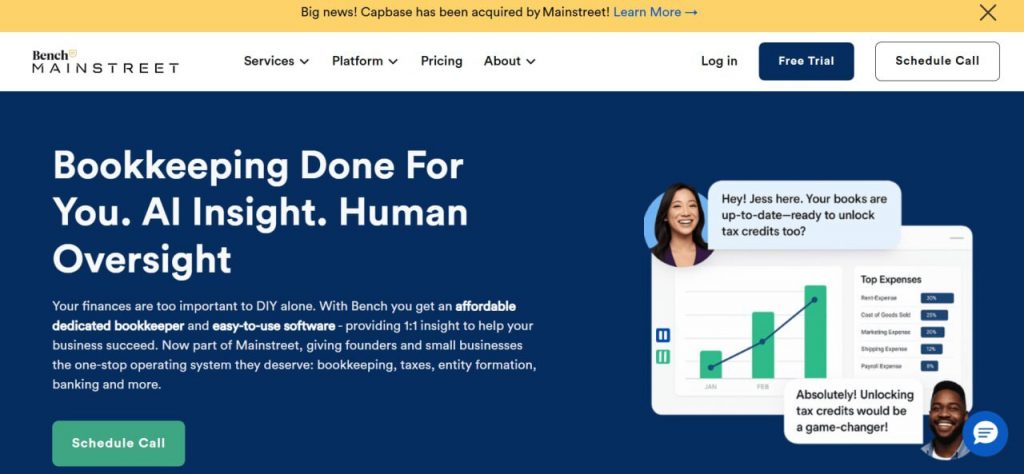
Bench is a bookkeeping service that pairs intuitive software with a team of professional accountants to manage your books. Designed for small and midsize businesses, including ecommerce sellers, Bench takes over monthly bookkeeping and tax preparation, reducing manual effort. However, its service-based model limits customization and real-time visibility compared to automation-first platforms.
Key capabilities
- Full-service bookkeeping with dedicated accountant support
- Automated data imports from ecommerce and payment platforms
- Monthly and quarterly financial closes with tax preparation options
- Simplified financial reporting and performance tracking
- Limited flexibility for custom mapping and accounting logic
- Delayed real-time visibility due to periodic service updates
Plans & pricing
BenchGrow – $189/month (billed annually) or $199/month (billed monthly): For small businesses with under $10K in monthly expenses; includes dedicated bookkeeping experts, monthly books, year-end tax-ready financials, P&L, balance sheet, 1099 reporting, and scheduled communication touchpoints.
Core – $339/month (billed annually) or $399/month (billed monthly): Includes everything in BenchGrow plus unlimited communication with your bookkeeping team.
Core + Tax – $599/month (billed annually) or $699/month (billed monthly): Full-service bookkeeping with tax filing and advisory; includes licensed tax professionals, annual income tax filing for businesses and individuals, and year-round tax support.
5. Pilot
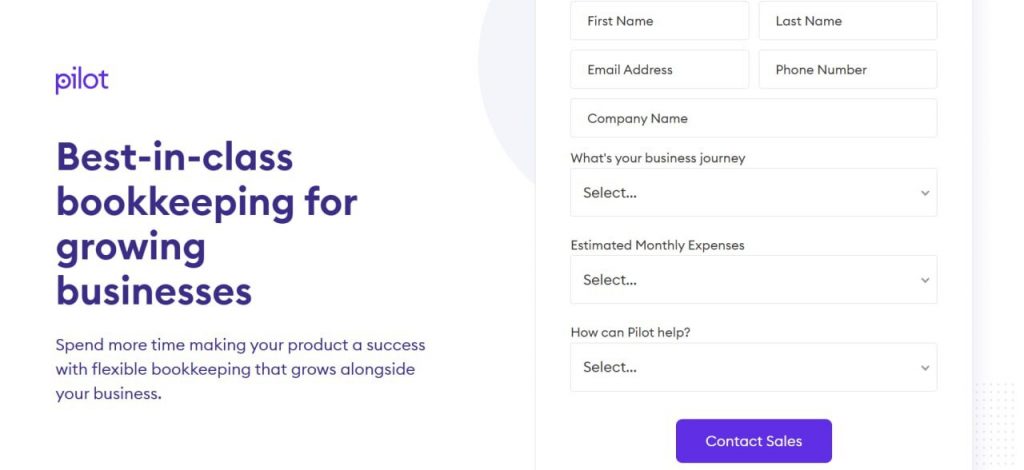
Pilot is a full-service financial partner offering bookkeeping, tax, and CFO-level advisory in one platform. It combines automation with hands-on accountant oversight, making it ideal for fast-growing ecommerce and SaaS companies seeking scalable, investor-ready financial management. While Pilot provides deep expertise and convenience, it offers less direct control and comes at a higher cost than software-only solutions.
Key capabilities
- Unified provider for bookkeeping, tax, and financial advisory services
- Expertise in subscription billing, deferred revenue, and multi-entity accounting
- Reliable, scalable infrastructure for growth-oriented businesses
- Automated data handling with accountant verification for accuracy
- Limited customization and direct control over accounting configurations
- Higher pricing due to a comprehensive, service-based model
Plans & pricing
Bookkeeping
Essentials – $169/month (billed annually): Monthly bookkeeping, real-time visibility, cash-basis P&L & balance sheet, year-end tax package, support from a U.S. bookkeeping team.
Core – $499/month (billed annually): Everything in Essentials plus accrual reporting, faster monthly close (reports by the 10th business day), enriched financial views, and phone/email support.
Custom (+ Add-ons) – Custom pricing: Built for companies seeking a complete back-office solution. Can include tax filings, payroll, vendor payments, sales tax, stock administration, R&D credits, CFO advisory, and fundraising support.
Tax
Starter – $750/year (billed annually): For first-year businesses spending under $500K annually. Includes federal and state corporate tax filings and a free tax extension.
Essentials – $2,450/year (billed annually): For unprofitable C corps without foreign subsidiaries. Adds city and Delaware Franchise tax filings and up to 10 1099-NEC filings.
Standard – $5,400/year (billed annually): For growing or profitable businesses. Includes up to 25 1099-NEC filings and expanded support for federal, state, and franchise tax filing.
CFO Services
Basic – $1,750/month (billed annually): Includes a custom financial model, budget vs. actuals analysis, scenario planning, KPI dashboard, and a monthly CFO call.
Essentials – $3,150/month (billed annually): Adds cash and runway optimization, investor reporting, fundraising and M&A support, and biweekly CFO calls.
Custom – $5,250/month (billed annually): Designed for growth-stage companies. Includes fundraising strategy, compensation planning, acquisition and GTM strategy, and weekly CFO advisory sessions.
How to choose the right alternative for your business
Before switching to a new tool, evaluate how each platform fits your existing tech stack, scales with complexity, and supports smooth onboarding and transparent pricing.
- Map your stack & workflows
List your sales channels, payment gateways, GL/ERP target, and special cases (subscription revenue, wholesale, refunds). Pick a system that covers your full stack. - Consider scaling and complexity
For multi-entity or international expansion, pick a solution that supports robust accounting (Synder’s ERP integrations help a lot here). - Compare pricing models
Tiers based on transaction volume (like Synder) tend to be more predictable than revenue-based pricing. - Mind onboarding & support
A great tool must also be adoptable without months of friction. Evaluate support and ease of setup.
Final thoughts
There are several strong alternatives to Finaloop, each suited to different business needs. Your ideal choice depends on factors like how much control you want, the complexity of your operations, and whether you prefer a software-driven or service-based approach.
For most growing ecommerce and SaaS companies, however, Synder stands out as the best option. It combines automation with full control, offering flexible sync modes, advanced mapping, ERP-level integrations, and transparent pricing, which ensures you get both scalability and precision without giving up oversight of your books.
FAQ
What is the best Finaloop alternative?
Synder is the best alternative to Finaloop, offering advanced automation, flexible sync modes, and deep ERP integrations. It centralizes multi-channel sales data, ensures accurate reconciliation, and provides full control over accounting workflows with transparent, scalable pricing.
What is the difference between accounting software and ERP?
Accounting software focuses on managing financial transactions, such as income, expenses, invoices, and bank reconciliation, to maintain accurate books. An ERP (Enterprise Resource Planning) system goes further, integrating accounting with other core business functions like inventory, HR, CRM, and supply chain for company-wide visibility and control.
What is ecommerce accounting?
Ecommerce accounting is the process of collecting, organizing, analyzing, and reporting a business’s financial data related to online sales. It covers essential accounting activities specific to ecommerce operations and includes bookkeeping to record and maintain all financial transactions accurately.




